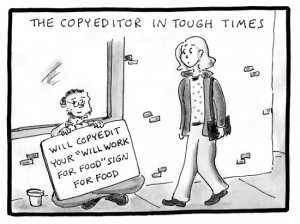 By Colorado Review Managing Editor Katherine Indermaur
By Colorado Review Managing Editor Katherine Indermaur
There’s something soothing to me about sentence structure, grammar rules, and being able to verify spelling in the dictionary. My siblings will all publicly attest to how I respond to their “My friend and me went—” with “My friend and…?” and a single raised eyebrow. Another pet peeve of mine is the confusion of fewer and less. Fewer should be used with things that can be counted, as in, “There were fewer hikers on the trail than I’d expected,” whereas less should refer to a reduction in degree or quantity. It takes a little more courage to offer such helpful pointers to friends and acquaintances, but I’ve admittedly been known to do so.
As an undergraduate, I began editing friends’ papers and writing assignments with gusto. I’d write little corrections in the margins of textbooks with a sigh or an eye roll. I bought a copy of the endlessly useful and intimidatingly heavy Chicago Manual of Style. After graduation, it was all I could do not to show up to job interviews with a list of corrections for companies to make on their websites. Somehow I figured my “Here’s what I can do for you!” attitude could negate any “Wow, who even works here and how’d they get so stupid?” impression I might make. Regardless, I continued to help friends and acquaintances with content like blog posts, marketing communications, cover letters, and résumés. I was a copyeditor in the making.
When I began my graduate studies at Colorado State, I was immediately drawn to the potential for this kind of work at the Center for Literary Publishing. We’re in the business of publishing content, both in print and online, and it’s our job to ensure that our content is accurate, correct, important, and—of course—artful. The latter requirements are mostly taken care of in the submission acceptance phase (for more on that, see past blog posts by editorial assistant Kitmik Borgard and associate editor Yash Seyedbagheri), but accuracy and correctness fall into the hands of the illustrious copyeditor. At the Center for Literary Publishing, many interns have the opportunity to learn and apply the skill of copyediting, but it takes a special kind of dedication to language and detail to truly enjoy it.
Sometimes the corrections I make are small and seemingly unimportant—inserting a comma here, removing one there—but, much like in reading for pleasure, offering my close attention to a piece inevitably pays off. I’ve encountered typos, misquotations, unattributed quotations, even authors misspelling their own names and book titles. Here at the Center for Literary Publishing, we also strive to honor our contributors’ style and voice. Reading a piece in its entirety before making any edits helps me get a sense of the choices the author is making to develop their style. Though righting the grammar and punctuation of a run-on sentence may not be earthshattering work, it demonstrates to our readers just how highly we value them and their experience in reading our publications.
The English language is a system, albeit a wonky and sometimes counterintuitive one. Writers can certainly choose to break the rules of that system, but it helps for us to first be aware of the rules from which we’re departing. And I’m happy to continually promote that awareness from my desk, with a very sharp, colored pencil.